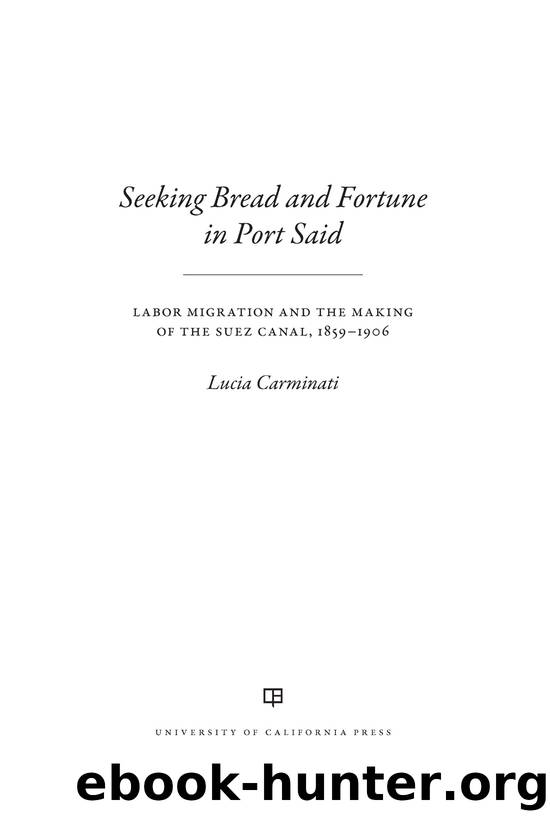Seeking Bread and Fortune in Port Said by Lucia Carminati;

Author:Lucia Carminati;
Language: eng
Format: epub
ISBN: 9780520385511
Publisher: University of California Press
The Plagues of Port Said
Quality and variety in Port Saidâs drinking scene notwithstanding, authorities in town did not appreciate these establishmentsâ business. In the eyes of many contemporary and later observers, the townâs inns and wine shops had become gathering spots for malefactors and especially foreigners. Some visitors expressed the conviction that local authorities had the power to close a bar down if a bloody altercation erupted there, thus interrupting sometimes successful businesses and causing problems for their managers.170 However, foreign owners, managers, and patrons technically remained shielded behind the countryâs extant capitulatory regime, which some consequently saw as an obstacle to its âmoral and physical purification.â171 Consular representatives loathed Port Saidâs drinking places as âthe plagues of Port Said.â Similarly, Catholic clergymen saw the cafés, music halls, and bars in town as fundamentally immoral.172 The Egyptian government decreed in 1891 that such venues ought to be located only in commercial neighborhoods, away from familiesâ residences, religious or educational institutions, and cemeteries or venerated tombs.173 As in the 1860s, authorities persisted in their attempts to regulate the opening and closing times of places of diversion in town (see chapter two). When the Egyptian government had decreed in 1867 that these establishments in Ismailia would lock their doors at 10:00 or 11:00 p.m., it had raised Company officialsâ hopes that a similar measure would be taken in Port Said.174 But come 1879, public establishments and brothels in the port city were routinely found open and operating past midnight. The Egyptian subgovernor general blamed them for compromising the safety and the repose of the cityâs inhabitants. He argued that such âignoble establishments and housesâ attracted bad subjects who fomented disorder and created the most regrettable scenes, in the wee hours of the night. Ostensibly, after a period of respite due to injunctions from their own consular authorities, the foreign owners of such venues had started contravening police regulations again. Each consulate, the subgovernor general pleaded, ought to place one janissary at the disposal of the police to help them close down these places at midnight sharp, have all kinds of music stopped, and make all customers leave.175
In 1883, attempting a crackdown, the governor decreed that cafés would close down at 10:00 p.m. Only a few could stay open until 12:30 a.m., and then exclusively under the stipulation that social peace be assured (the Eldorado, Casino, Friedmann, Palatine, Café de France [Hôtel], Bletty, Glacier, Neumann, and Fink). If foreign owners wanted to keep venues open part of the night or all night long for public festivities or other reasons, they needed to request from the governorate a special authorization via their consular authority. Consular representatives all agreed to this measure. Nonetheless, in 1884 the closing time was once again modified and was pushed to 11:00 pm rather than 10:00 p.m. For those owners who wanted to keep their establishments open past the fixed hours, the possibility to obtain special authorizations was still contemplated.176 Accordingly, all the consuls in the city were notified, signs
Download
This site does not store any files on its server. We only index and link to content provided by other sites. Please contact the content providers to delete copyright contents if any and email us, we'll remove relevant links or contents immediately.
Verus Israel: Study of the Relations Between Christians and Jews in the Roman Empire, AD 135-425 by Marcel Simon(552)
Infocracy by Byung-Chul Han(540)
Caesar Rules: The Emperor in the Changing Roman World (c. 50 BC â AD 565) by Olivier Hekster(530)
Europe, Strategy and Armed Forces by Sven Biscop Jo Coelmont(477)
Banned in the U.S.A. : A Reference Guide to Book Censorship in Schools and Public Libraries by Herbert N. Foerstel(446)
Reading Colonial Japan by Mason Michele;Lee Helen;(443)
The Roman World 44 BC-AD 180 by Martin Goodman(437)
Give Me Liberty, Seventh Edition by Foner Eric & DuVal Kathleen & McGirr Lisa(436)
DS001-THE MAN OF BRONZE by J.R.A(423)
The Dangerous Life and Ideas of Diogenes the Cynic by Jean-Manuel Roubineau(417)
The Oxford History of World War II by Richard Overy(414)
Introducing Christian Ethics by Samuel Wells and Ben Quash with Rebekah Eklund(412)
american english file 1 student book 3rd edition by Unknown(412)
Imperial Rome AD 193 - 284 by Ando Clifford(409)
Basic japanese A grammar and workbook by Unknown(392)
Literary Mathematics by Michael Gavin;(373)
Language Hacking Mandarin by Benny Lewis & Dr. Licheng Gu(352)
How to Reach the 9.0 in IELTS Academic Reading by IELTS Medical(333)
The Oxford History of the Renaissance by Campbell Gordon;(332)
